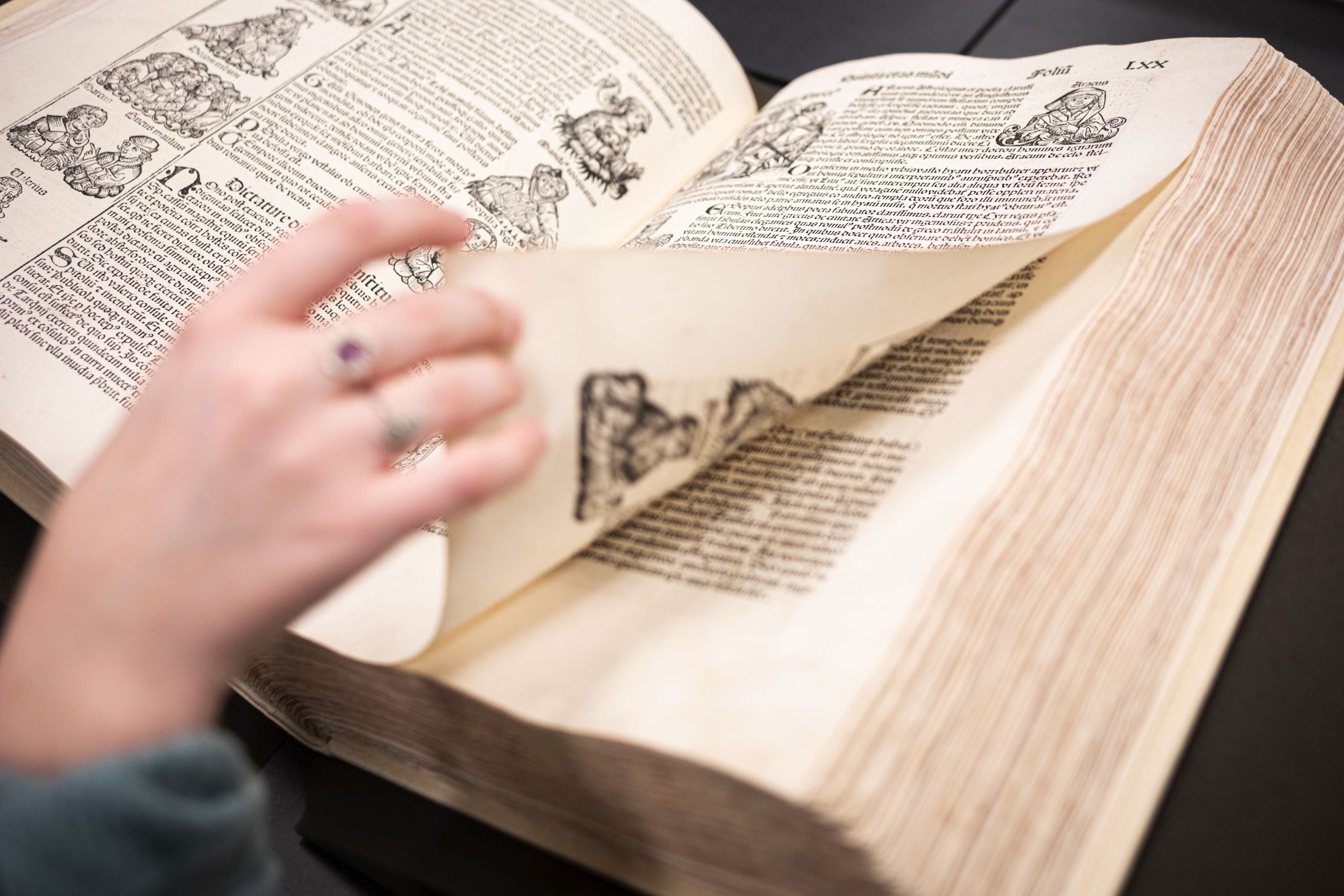Description. This course offers a hands-on exploration of the nature of texts, of the practice of editing in a digital environment using historical printed sources, and of issues related to interface, reading, and access. We’ll learn the essentials of digital text editing and encoding, including transcription in XML, using the widely-adopted guidelines of the Text Encoding Initiative (TEI), protocols for collaboration, text processing using XML-based languages like XPath, XSLT and XQuery, and basic techniques for web publishing (XSLT, HTML and CSS). No prior experience with any of this is required or expected (if you have any questions or concerns about this, please contact me at gt2@uw.edu).
- TXTDS 414 is a new course in a proposed minor in Textual Studies and Digital Humanities. This curriculum will offer training in working with historical textual materials, from medieval manuscripts to early printed books to archival documents to artists’ books, and with digital text, textual data, and digitization technologies. The program will be of interest to undergraduates interested in careers working in libraries and special collections, publishing and editing, archives, cultural institutions and in professions or graduate programs that require working with cultural and literary texts in digital environments.
See below for more information about the minor.
|
Course goals include:
-- introduction to histories and theories of literary editing and textual scholarship from the Renaissance to today; working with early editions, primary sources and historical documents (including in UW Special Collections); how to define the text of a literary work in light of the history of its editions, variations, and reception; how to develop an editorial apparatus, situating a work in context.
-- better understanding of early printed books and the history of print: how printed books were produced, circulated and read; how to study them today, as historical artefacts.
-- introduction to techniques for digitization, digital editing and processing: including transcription (manual and using OCR tools), text encoding using TEI (an XML vocabulary for the digital encoding of literary, historical and cultural texts) and related XML-based technologies, such as XPath, XSLT, and XQuery; other encoding/digitization as well as processing options, using programming languages like Python.
-- philosophical and critical reflection on the digitization of literary works and historical materials, including original editions: the benefits and pitfalls of digitization. Questions of access, openness, what does and doesn't get digitally preserved; metadata and cataloguing; the role of search engines and indexing. The role of copyright: remediation and text reuse. The challenges of time: maintaining books, websites.
-- introduction to the history, present and future of the public sphere, shaped by print and now the internet; the role of “publication” in the formation of the public sphere; its role mediating between individuals and communities, from groups with like-minded interests to professional networks to national communities and beyond.
-- project-management; collaboration within a small team: working with collaboration tools like Github and Google tools.
-- basic introduction to aspects of digital text processing and publication: platforms for publishing TEI-encoded documents; basics of web-publishing: HTML and CSS, and to how the web works: web-servers, HTTP, etc. Reflection on interface and “reading” in a digital vs. non-digital environment.
For graduate students in TXTDS 504:
-- practice and training teaching complex materials to undergraduates and experience working with undergraduates as mentors
-- a project that will enrich the graduate student's work towards their home degree; this might be a digital complement to a research paper; an edition of a work that student is working on in a dissertation; or simply a new methodological dimension to their work.
-- the ability to present and articulate a project and original argument in a scholarly professional context
Undergraduate students can pursue a minor in the interdisciplinary study of the history, present, and future of texts — from scrolls, manuscripts, and printed books to archival documents, digital texts, and textual data.
 Students can explore how texts have been written, published, read, circulated, and archived from antiquity to today. Courses include hands-on work with historical texts, archival sources, and contemporary artists’ books, as well as with methods for editing, digitizing, exhibiting, and publishing texts. Students will also gain experience building and analyzing text-oriented databases and archives.
Students can explore how texts have been written, published, read, circulated, and archived from antiquity to today. Courses include hands-on work with historical texts, archival sources, and contemporary artists’ books, as well as with methods for editing, digitizing, exhibiting, and publishing texts. Students will also gain experience building and analyzing text-oriented databases and archives.
The minor will be of interest to students thinking about further studies or careers in editing and publishing, libraries and library science, archives and cultural institutions, and in contexts that involve working with cultural and literary texts in digital and/or archival environments.
25 credits total.
Including at least 2 course from the course sequence of courses:
TXTDS 401 Text Technologies (5, max. 10) VLPA/I&S
TXTDS 402 Book Arts (5, max. 10) VLPA
TXTDS 403 Archives, Data, and Databases (5, max. 10) VLPA/I&S
TXTDS 404 Texts, Publics and Publication (5, max. 10) I&S/VLPA
The following two courses will, in addition, be added to the core sequence and may substitute:
TXTDS 413 Texts, Data, and Computation (5, max. 10) VLPA/QSR
TXTDS 414 Digital Editing and Text Processing for Publication (5, max. 10) VLPA/I&S
Students can explore how texts have been written, published, read, circulated, and archived from antiquity to today. Courses include hands-on work with historical texts, archival sources, and contemporary artists’ books, as well as with methods for editing, digitizing, exhibiting, and publishing texts. Students will also gain experience building and analyzing text-oriented databases and archives.
